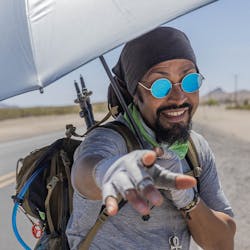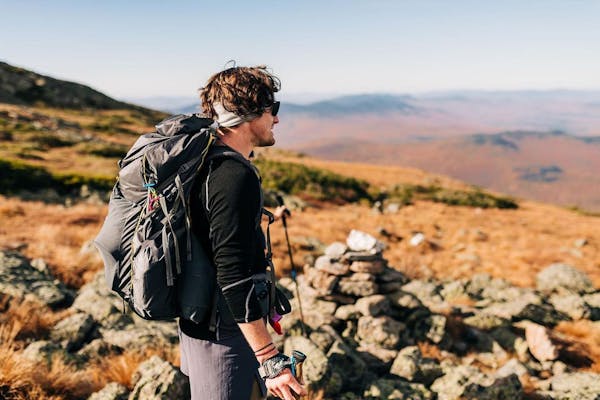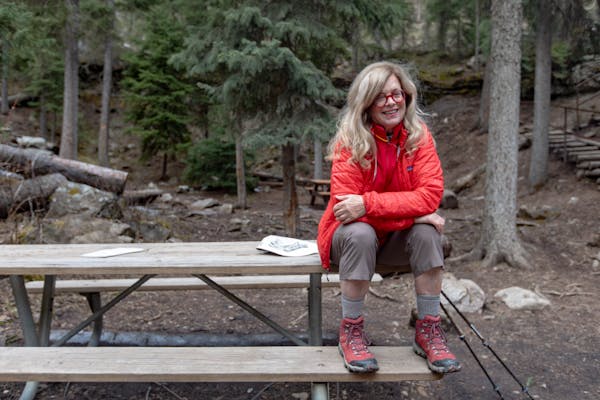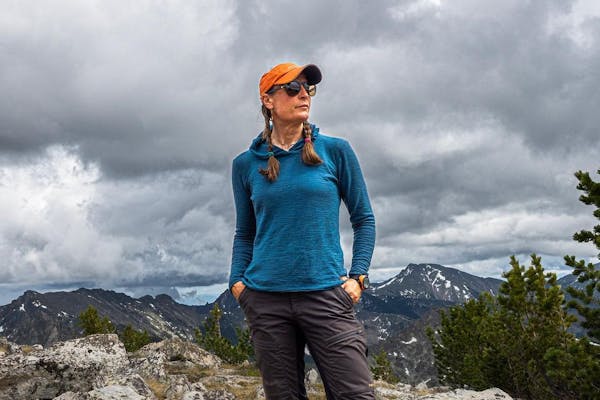Carol Kennedy is a retired elementary and special education teacher living in Fort Collins, Colorado. She is devoted to helping differently abled people enjoy the outdoors.
Derick: Carol, you're in Colorado, correct?
Carol: Yeah, Fort Collins, north of Denver.
Derick: I love Colorado. I did the Continental Divide Trail couple years ago, and Colorado was an interesting section. It was both beautiful and tough. In your bio, I read that you’re devoted to helping differently abled people. I like that term, but I’m curious—does it refer to people with disabilities, or is it something entirely different?
Carol: I guess you could say it traditionally refers to people with disabilities, but there's a lot can be said by how you use language. There are many people who might be labeled as disabled, but they function quite well—they just think, move, and operate differently than the rest of us. That’s where the term 'differently abled' comes in. For some, navigating the world is more challenging—whether due to communication issues or other factors. But for others, it’s about learning to approach the world differently, finding accommodations, and functioning in their own way. It’s a catch-all term that covers a lot of different situations. Does that make sense?
Derick: Yes it does. So, you’re volunteering to help differently abled people enjoy the outdoors, right?
Carol: Yes, in multiple contexts and with various agencies.
Derick: Could you elaborate on that a bit more?
Carol: I first got involved in this area through the Boy Scouts. My son, was an Eagle Scout, was active in the troop many years ago, and I was one of the leaders. We had a young man joining the troop who I had also interacted with in my role as a retired teacher, though only to a small degree. The question arose: “How do you support a young man with disabilities?” To find answers, I attended a national conference at Philmont Scout Ranch in New Mexico to learn about the scouting community's efforts to be inclusive of individuals with different abilities. Ultimately, this young man attended only a couple of scouting meetings and did not continue further. But it put me in good stead, and I went on to work with other troops and engage in various activities within the scouting community for special needs.
My favorite quote from a conference came from the woman who led the session: “What’s fair isn’t necessarily equal.” As a society I think we have an obligation to try and level the playing field for people who need a little something different to help them enjoy the outdoors or be educated or just doing life in general.

Derick: How do you approach that? How are you helping them?
Carol: I think of it as being sort of a puzzle where you get to know the person. You approach the person as you would approach anyone else, and you adjust your delivery as you get to know them. If the person is responding differently you have to figure out, how do I adjust my approach to meet their needs? It might be differentiated communication. It might be differentiated equipment. More time, in a lot of cases. Ultimately these experiences led me to go back and get a master’s in special education so that I could I be better equipped to handle this in the classrooms and beyond.
Derick: Nice. So, the goal isn’t necessarily for them to excel at the activity. It’s more about what they can gain from the experience, whether it’s socializing with others, becoming more verbal, or simply staying active. The main objective is to be out there, doing something different in the outdoors and seeing the benefits that come from that, correct?
Carol: A phrase keeps coming to mind, “It’s more than just skiing.” You can also say it's more than just hiking. I mean you've done a lot of thru-hiking and what you've gotten from that is more than just knowing physically you can do it. I read some of the stuff about you also and just knowing that there are lessons to be learned that are far more than what you're doing out there on the trail.
Derick: So true. That’s a perfect answer. So, you’re a volunteer skiing instructor—do you also engage in other volunteer work related to outdoor activities?
Carol: Right now, I am volunteering for four different agencies. I volunteer for Poudre Wilderness Volunteer, and I've done some community outreach to try and increase diversity within our organization. I volunteer for the city of Fort Collins and their adaptive rec organization. That's part of what I have found truly in the community of people who are disabled is that there's a lot of networking among the caregivers. You’ll see them in multiple places under different agencies, but sometimes it’s the same people. I do adaptive cycling for the city of Fort Collins, and I've done adaptive cooking. I also have done, not a lot, but I've done some, adaptive climbing at an indoor climbing gym for an agency called Adaptive Adventures. I do a lot of belaying. The person I belay the most is visually impaired, which I've done a lot of training on how to ski with people who are visually impaired. That transfers to how do you teach someone to climb. You have to learn exactly what their vision is about and how to communicate with them. Where they like to go to best and what works best for them. You work with someone enough times you get a feel for how that person functions in that context.

Derick: It seems like you need to be able to read people a bit. It’s important to step back and assess how you can help without immediately jumping in with solutions. Understanding who the person is before taking any action is crucial, right?
Carol: Right. And a lot of that is communicating with the person. It's a, “Do you mind if I ask you or do you mind if I ask you because it will help me help you enjoy this experience the most?” You talk to the person, you talked to whatever caregivers are with them in the situation if there are any. Then you adjust as you get to know the person.
Derick: Very interesting. I’d like to shift the focus to a slightly different topic or maybe not. What are fiber arts, and do you incorporate that with helping others?
Carol: Honestly, fiber arts is something I do mainly for myself. It encompasses everything from sewing and knitting to embroidery— basically all those kinds of crafts. I believe there’s a lot to learn from fiber arts, especially when it comes to mathematics and visual skills. I think that's an important realm that we're so stuck on teaching to testing in schools that we kind of forget some of the real-world skills. You might also enjoy a book called Last Child in the Woods, which explores 'nature deficit disorder.' It's about the importance of getting kids outdoors, and the message applies to adults as well. Being in nature involves a lot of problem-solving.
Derick: Recommending a book to me is like putting it directly in my hands—I’ll be sure to get it. So, who’s your favorite Oboz dealer?
Carol: My local retailer Brown Shoe Fit Company. I’m breaking in a pair of Oboz. I’m experimenting with what was available that goes with my feet.

Derick: I love Oboz. For me, they’re the best shoes I’ve used, but everyone has different feet, so what works for me might not work for everyone. I hope they break in well for you.
Another question: Do you have any pro tips for people who love the outdoors, whether it’s skiing or something else? Anything you can share would be great.
Carol: I think it gets back to that business of needing each other and not being afraid to ask for advice from people who are pros, and then when you're out there at some point you just have to learn to put one foot in front of the other and keep moving. For me, that has also become an analogy for getting through some of the more difficult times in my life. I lost a child almost 10 years ago.
Being in the outdoors has been very healing. Doing the volunteer work has been very healing. We need each other and you have to put one foot ahead of the other and keep moving forward. You can't stall out even in the depths of having lost a child. There were what someone phrased unwanted gifts. Meeting people who had the same challenges as my daughter had and how they have pulled through that, how they deal with it. Even out on the Colorado trail last week as I'm walking along and my feet were hurting, I'm going, “I am really lucky to be here. I am lucky that I don't have the challenges that some people have.” Walking along with my feet hurting is nothing compared to dealing with something that threatens your life every day, every minute of every day. Substance abuse disorder is identified as a disability under ADA and it's on the DSM 5. Meeting people on how they accommodate that to me is just absolutely amazing. They put one step ahead of the other and they just keep moving forward. Does that make sense?
Derick: It really does. That’s a big answer. I’m sorry for your loss. The lesson of putting one foot in front of the other, no matter the challenge, is something I’ve learned and now try to share. I recently saw a video where someone mentioned that every hundred years, this planet has a completely new set of people. He talked about how grateful he is to be living with the people around him, like you and me, in the same time frame. In another 100 years, we’ll be gone, and a new generation will take our place. It’s incredible to think about it that way, rather than focusing on our daily problems. Understanding that we’re only here for a fraction of time reminds us to take it one step at a time, and I love that perspective.
Carol: Also, we should aim to leave the world so that future generations—people we’ll never meet—can enjoy the same things we do. We might not be able to make it better, but at least we can keep it just as good. By working with others and leveling the playing field for those who need extra support, we can create a better world. Embracing diversity and striving for equality helps ensure that the world we leave behind is one that future generations can thrive in. How much richer our world is for having different people in it. The year that my father died, the thing that was most therapeutic for me was skiing. It's what I do, but being up there and teaching the skiing to people with disabilities, somehow it's so therapeutic to be out there going I have this loss, but I can still make this contribution to make the world better for other people.
Derick: Yep, when you live for others, you truly live for yourself. Ok, who nominated you for Oboz’s Local Hero, and what's your relationship with them?
Carol: Jeff Randa is another member of Poudre Wilderness Volunteers. I think he's a board member. He does a lot of general public relations and outreach. In 2020, we had massive forest fires but knowing that our organization kind of spearheads a lot of the trail work, he's the one that hosted a party to raise money for a GoFundMe for restorative trail work that happened after this fire burned.
We’re one Ranger district here in Colorado and we patrol I think it's 58 trails, pwv.org. We’re involved in pretty much any kind of trail work that's needed. We are either doing the work, recruiting people, running volunteer events or we're helping fund it for the Forest Service. Jeff’s out there trying to do outreach with other organizations too. He ran our spring training for new volunteers the last two years. He's also involved in the Oboz Trail Experience locally, which is happening here in September.
Derick: Is there anything else you’d like to share with people about what you’re doing or anything that could help others?
Carol: Maybe just that random acts of kindness can ripple out like waves in a lake. You never know how one small gesture can make a big difference in someone else's life. Just one small act of kindness can go a long way.
Derick: I completely agree. I think back to when I was a kid—how much we absorb at that age. I remember the things that stuck with me, and it’s why I try to be as positive as possible, especially with kids. They soak up everything around them. That’s why I do so many talks and focus on spreading kindness. It’s something I’ve learned, especially after thru-hiking the Appalachian Trail. I’m totally on the same page with everything you’re saying. Well, it was great talking to you, Carol.
Carol: Likewise

Happy Trails
For more information on our Local Heroes check out this page. To stay up to date on all things Oboz check out our Instagram @obozfootwear!




